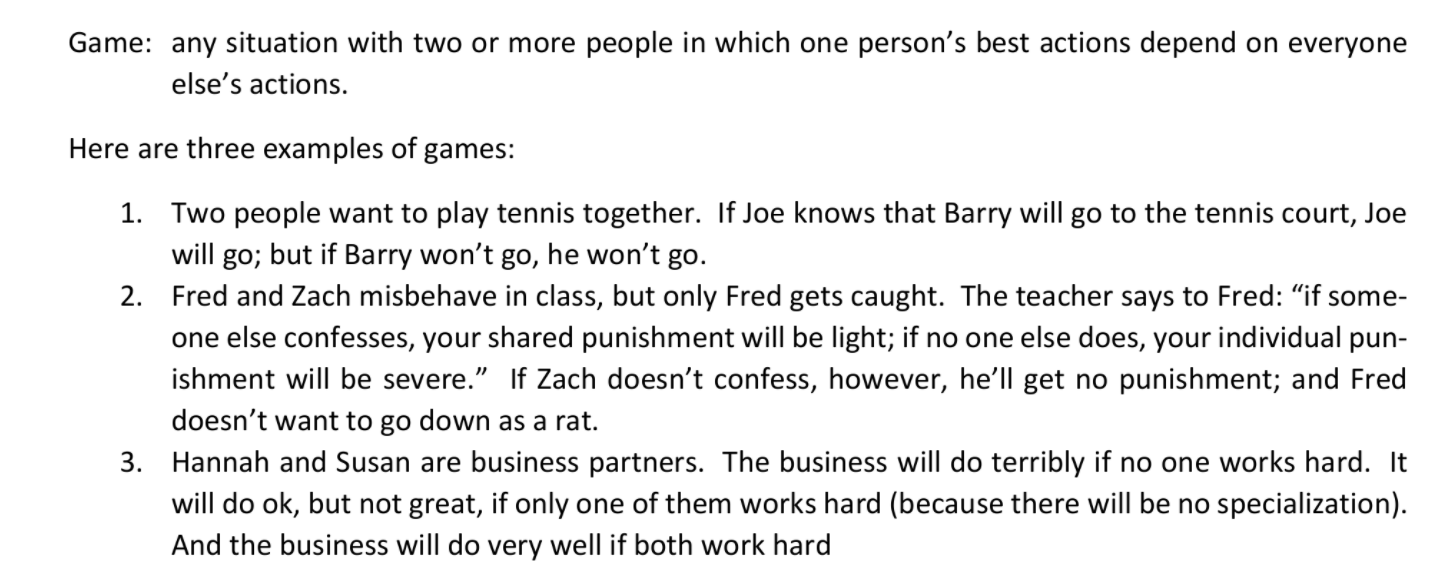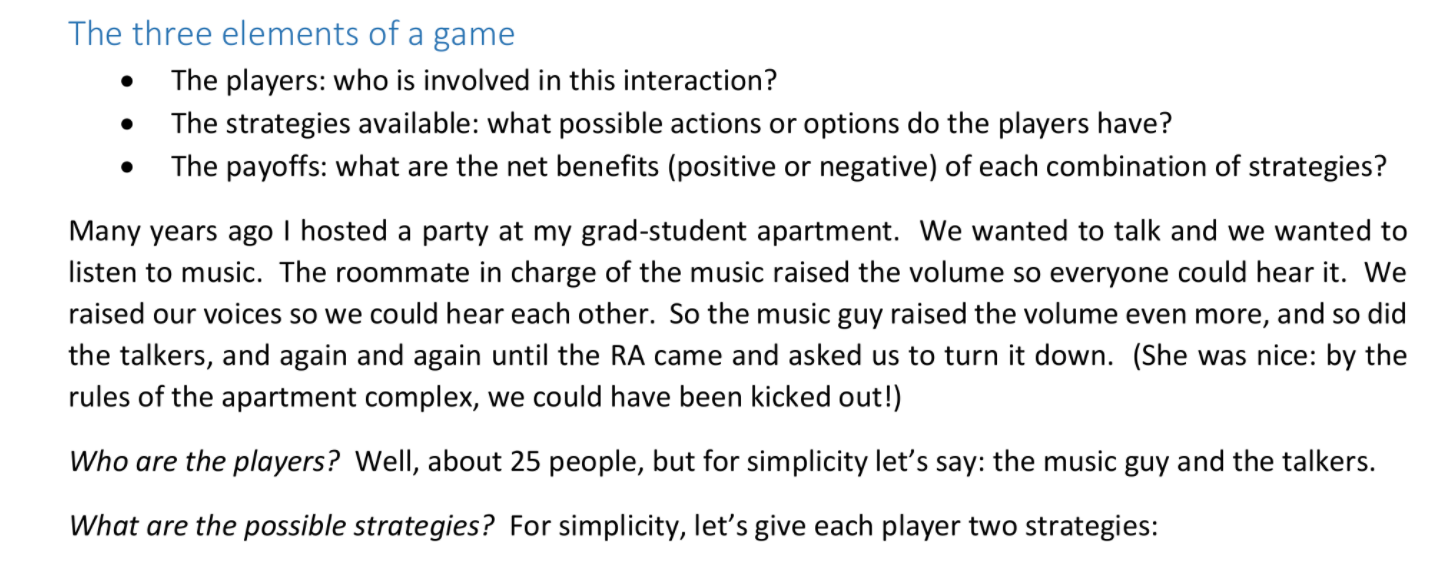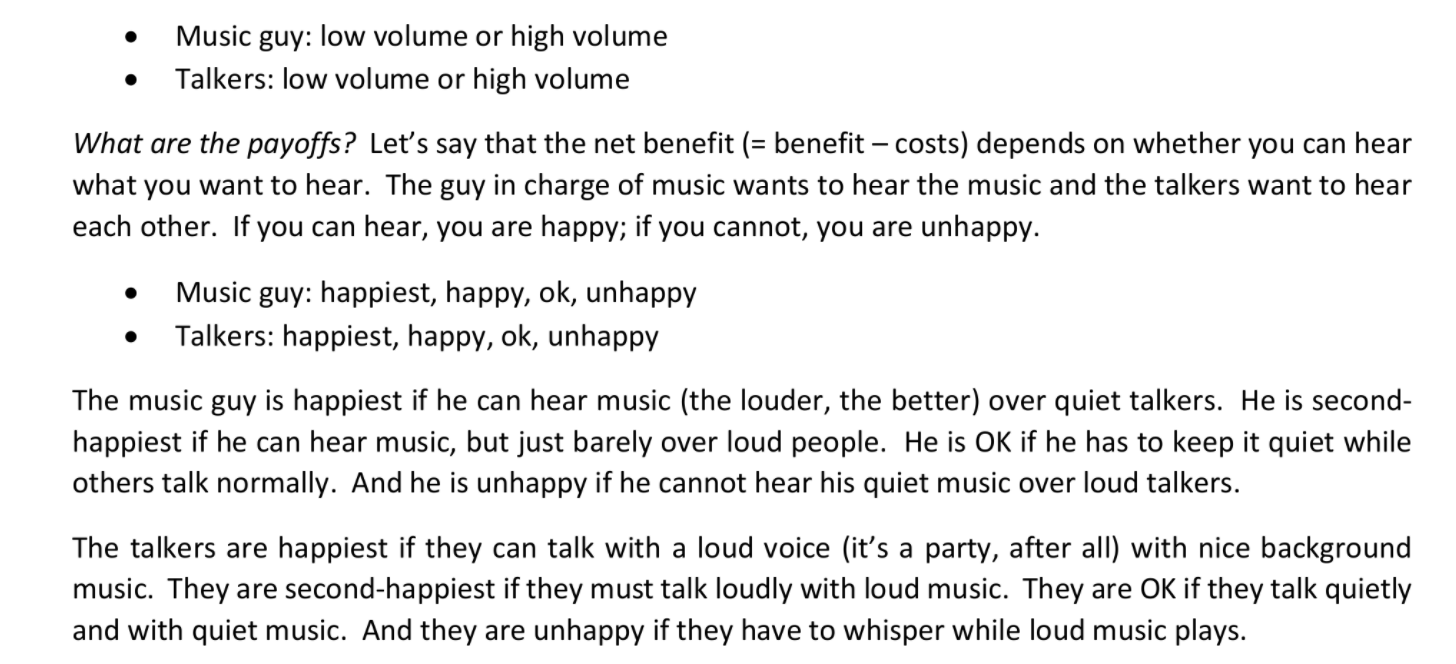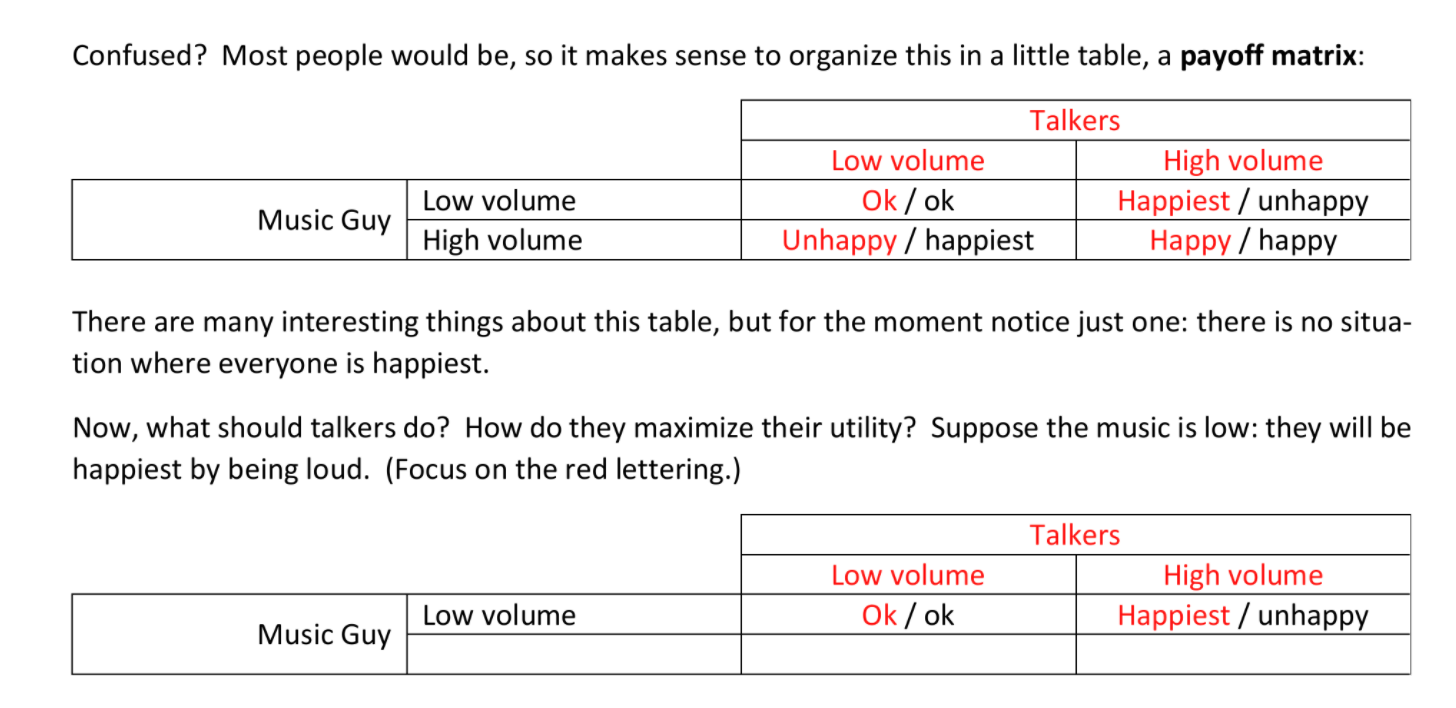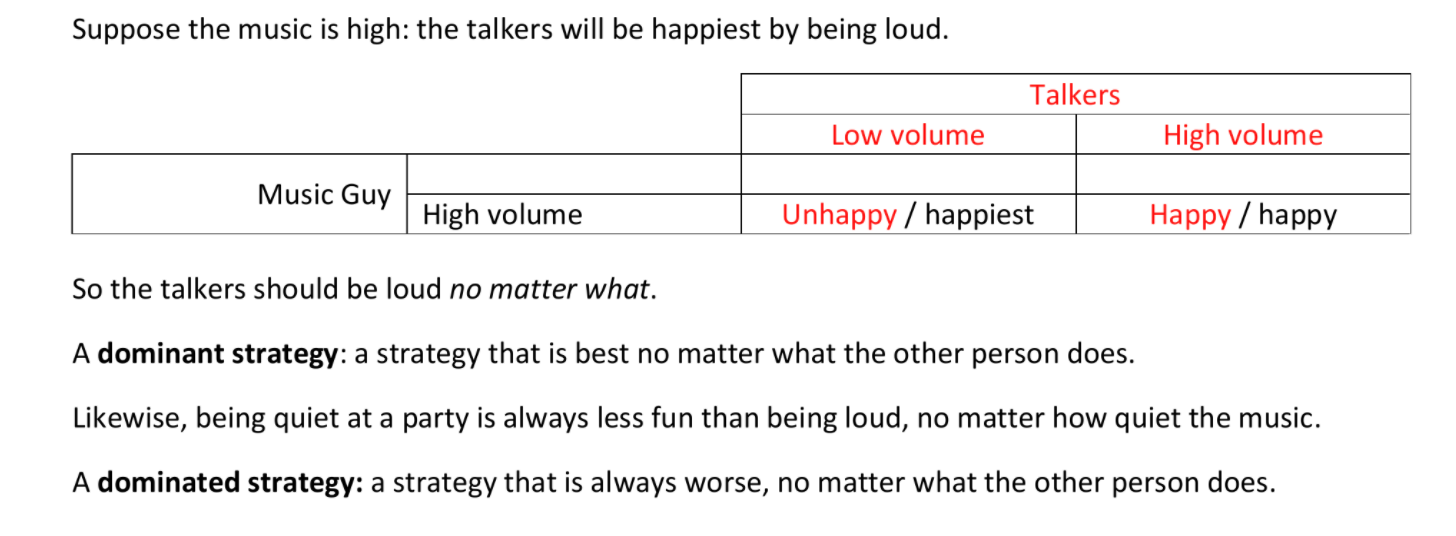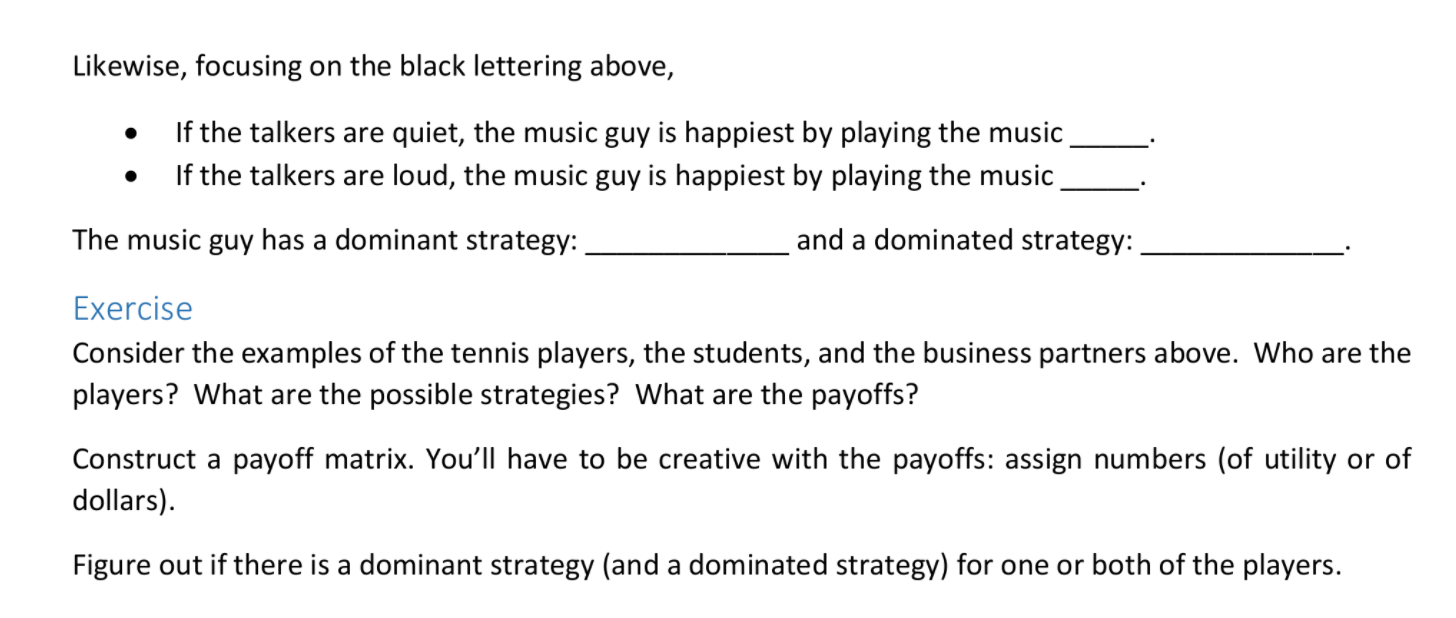Using Game Theory to Analyze Strategic Decisions In perfect competition or monopoly, the firm does not have to worry about how its competitors will react (or about how they would react to the firm's reaction to their reactions). Its best strategy depends on its own cost structure and external factors that don't depend on the firm's decisions. But if your business is one of only a handful of competitors, you will be watching each other very closely, anticipating each other's reactions: your best strategy depends on your competitors' best strategy, which in turn depends on yours. You are familiar with this kind of situation, from sports to board games, from friendships to relationships, from driving down the highway to walking down the hallway. Your best actions depend on everyone else's actions. Game: any situation with two or more people in which one person's best actions depend on everyone else's actions. Here are three examples of games: 1. Two people want to play tennis together. If Joe knows that Barry will go to the tennis court, Joe will go; but if Barry won't go, he won't go. 2. Fred and Zach misbehave in class, but only Fred gets caught. The teacher says to Fred: "if some- one else confesses, your shared punishment will be light; if no one else does, your individual pun- ishment will be severe." If Zach doesn't confess, however, he'll get no punishment; and Fred doesn't want to go down as a rat. 3. Hannah and Susan are business partners. The business will do terribly if no one works hard. It will do ok, but not great, if only one of them works hard (because there will be no specialization). And the business will do very well if both work hardThe three elements of a game 0 The players: who is involved in this interaction? 0 The strategies available: what possible actions or options do the players have? 0 The payoffs: what are the net benefits (positive or negative) of each combination of strategies? Many years ago I hosted a party at my grad-student apartment. We wanted to talk and we wanted to listen to music. The roommate in charge of the music raised the volume so everyone could hear it. We raised our voices so we could hear each other. So the music guy raised the volume even more, and so did the talkers, and again and again until the RA came and asked us to turn it down. (She was nice: by the rules ofthe apartment complex, we could have been kicked out!) Who are the players? Well, about 25 people, but for simplicity let's say: the music guy and the talkers. What are the possible strategies? For simplicity, let's give each player two strategies: 0 Music guy: low volume or high volume 0 Talkers: low volume or high volume What are the payoffs? Let's say that the net benefit (= benefit costs) depends on whether you can hear what you want to hear. The guy in charge of music wants to hear the music and the talkers want to hear each other. If you can hear, you are happy,- if you cannot, you are unhappy. 0 Music guy: happiest, happy, ok, unhappy o Talkers: happiest, happy, ok, unhappy The music guy is happiest if he can hear music (the louder, the better) over quiet talkers. He is second happiest if he can hear music, but just barely over loud people. He is OK if he has to keep it quiet while others talk normally. And he is unhappy if he cannot hear his quiet music over loud talkers. The talkers are happiest if they can talk with a loud voice (it's a party, after all) with nice background music. They are second-happiest if they must talk loudly with loud music. They are OK ifthey talk quietly and with quiet music. And they are unhappy ifthey have to whisper while loud music plays. Confused? Most people would be, so it makes sense to organize this in a little table, a payoff matrix: Talkers Low volume High volume Low volume Ok / ok Music Guy Happiest / unhappy High volume Unhappy / happiest Happy / happy There are many interesting things about this table, but for the moment notice just one: there is no situa- tion where everyone is happiest. Now, what should talkers do? How do they maximize their utility? Suppose the music is low: they will be happiest by being loud. (Focus on the red lettering.) Talkers Low volume High volume Low volume Ok / ok Music Guy Happiest / unhappySuppose the music is high: the talkers will be happiest by being loud. Talkers Low volume High volume Music Guy Unhappy] happiest Happy / happy High volume So the talkers should be loud no matter what. A dominant strategy: a strategy that is best no matter what the other person does. Likewise, being quiet at a party is always less fun than being loud, no matter how quiet the music. A dominated strategy: a strategy that is always worse, no matter what the other person does. Likewise, focusing on the black lettering above, 0 If the talkers are quiet, the music guy is happiest by playing the music . o If the talkers are loud, the music guy is happiest by playing the music . The music guy has a dominant strategy: and a dominated strategy: Exercise Consider the examples of the tennis players, the students, and the business partners above. Who are the players? What are the possible strategies? What are the payoffs? Construct a payoff matrix. You'll have to be creative with the payoffs: assign numbers (of utility or of dollars). Figure out ifthere is a dominant strategy (and a dominated strategy) for one or both of the players

